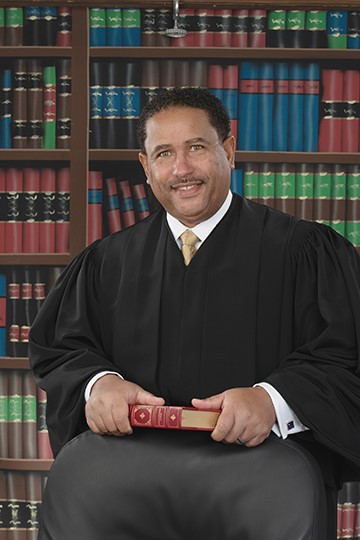
Judge Joseph L. Guillory II
Justice of the Peace, Precinct 2
Representing Yourself in Court
Below are several sources of information for persons who do not
have a lawyer.
The information is not legal advice and does not take the
place of an attorney.
Justice Court
Justice Court is a judicial forum to hear and decide civil cases
involving claims in the amounts of $20,000.00 or less. The person
filing the suit is known as the Plaintiff. The person being sued
is called the Defendant. The Plaintiff will fill out a sworn
petition and pay a filing fee and service fee called the "court
costs" when filing the case. The Plaintiff will need to provide
the correct name of the Defendant, he/she is filing against, a
physical address where the Defendant can be served their petition
and citation, the amount of money filed for, and the reason for
the suit. The Plaintiff will also have to determine which case
type to file.
The filing fee in a Civil suit is $54.00 and for Evictions,
filing fee is $54.00 The service fee is $75.00 in a Civil suit for
serving one defendant in Jefferson County, each additional
Defendant will be $75.00 more to serve.(If they live in another
county, the service fee could be different.) In an Eviction suit,
the service fee is $75.00 for each defendant.
The clerk prepares a Citation and sends it to the proper
Constable for service. It takes about 6-8 weeks to serve the
defendant, (sometimes a little longer, if it is going to an out of
county constable). As soon as the Constable returns the citation
to the court, the clerk will call the Plaintiff and inform them of
the court date. Prior to the Court notifying you, it is your
responsibility to keep in touch with the court regarding your case
(you should provide a case number or the names of the parties as
filed-called the "Style" of the Case.
If the Defendant chooses not to appear, a Default Judgment may
be granted against them. If Judgment is found for the Plaintiff,
the Judgment will include the Court Costs paid to file the case.
Please do not include the amount of costs in the amount you are
filing for.
In the State of Texas, there is no guarantee that you will
collect the Judgment from your Defendant.
If the Defendant has not satisfied the Judgment with the
Plaintiff, the Plaintiff may file for an 'Abstract of Judgment' 21
days after Judgment, at the cost of $8.00 payable to the court,
which puts a lien against any real property (such as their house
or any land the Defendant may own) for 10 years and is renewable
every 10 years. The Plaintiff will file the Abstract of Judgment
with the County Clerk's office. You should call the County Clerk's
office for the filing fee. This abstract may be filed in as many
counties as the Defendant owns property in. Once the Judgment has
been satisfied, the Plaintiff should remove the Abstract by filing
a 'Release of Judgment' with the County Clerks office.
Alternatives To Payment of Fines and Cost
A defendant who is convicted of a criminal offense punishable by
fine only is entitled to alternative methods of satisfying the
judgment against them if they are unable to pay the fine or costs,
in whole or in part.
Those alternative methods include:
-
A payment plan, allowing the defendant to make payments
toward the fine and costs in designated intervals. Note that if
any amount is paid more than 30 days after the judgment
assessing the fine or costs then a $15 time payment fee must be
assessed.
-
Disposition of the amount assessed by performing community
service. There are many options that meet the requirements of
the law for community service, see Art. 45.049 of the Code of
Criminal Procedure for full details. A defendant is entitled to
a minimum of $100 credit for every 8 hours of community service
performed.
-
If performing community service imposes an undue hardship, a
defendant who is indigent or who lacks sufficient resources to
pay may be entitled to a waiver of the fine and costs, in whole
or in part.
